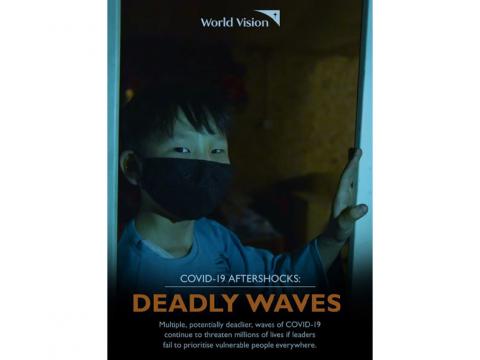Majority of people in donor countries believe governments should increase overseas COVID-19 funding to avoid deadly second waves for all

- 80% of people surveyed in major donor countries believe their country won’t be able to return to normal life until COVID-19 is under control everywhere in the world.
- Multiple, potentially deadlier, waves of COVID-19 could continue to threaten millions of lives if leaders fail to prioritise vulnerable people everywhere.
- If COVID-19 deaths mirror the 1918 influenza pandemic, more than 1.56 million people globally may die after a second wave2, with potentially millions more dying from secondary health impacts caused by the pandemic.
A report released today by international aid agency, World Vision, reveals that 61% of people surveyed in seven donor countries want their governments to invest in the global battle against COVID-19. The majority of those interviewed by World Vision in Australia, Canada, Germany, Japan, Netherlands, Switzerland, and the UK, believe that repeated outbreaks in other countries threatened their own nations.
Aftershocks: Deadly Waves also warns that 1.56 million people are at risk of dying in a deadlier second wave of COVID-19 if governments do not do everything they can to prepare and protect everyone globally.
“Children cannot wait much longer. We have to respond where children and families are most vulnerable to the aftershocks of COVID-19, and it’s clear we must increase support for countries with weaker health systems. This is going to be crucial if we are to protect everyone everywhere. Borders cannot be closed indefinitely and the virus does not distinguish between nationality or wealth,” said Andrew Morley, World Vision International President and CEO.
If the virus continues to thrive in fragile countries, it will pose a perpetual health and economic threat to both the world’s poorest people and the richest, World Vision’s new report finds. It warns that just like countries devastated by illnesses like AIDS or Ebola, many poorer countries will inevitably require massive investment to address the social and economic fallout from COVID-19.
“Our Aftershocks reports have highlighted the clear and present danger posed to children by COVID-19: violence, secondary health impacts, devastating loss of family income and more. These all threaten children’s rights to realise their God-given potential. And our latest research is clear; people want governments to lift their eyes above their own national interests, and ensure the most vulnerable in the world are taken care of. Those in power must act and think like world leaders,” said Morley.
World Vision is recommending that governments invest in robust testing and tracing which can avoid extended lockdowns, which can be harmful in wealthy countries and impossible in poorer countries. The NGO is also calling for all countries and contexts - particularly those most fragile – to be equipped with appropriate resources to ensure that vaccines, when available, can be safely and comprehensively distributed. World Vision urges all donors to fully fund the UN’s $10.3bn appeal to protect those in fragile and conflict affected contexts now - an appeal that, as of August 12, was only 20.4% funded.
“Constituents have very clearly stated that donor governments must do everything they can to protect the world’s most vulnerable children, and avoid a second wave crisis everywhere. It’s not too late to prevent this,” said Morley.
ENDS
Notes to editors:
For further information or to organise an interview, please contact
Niamh Cooper | Director of Media and Social Media Engagement | niamh_cooper@wvi.org | Skype: Niamh.cooper5 | Phone: +353 87 942 3371
You can read World Vision’s Aftershocks: Deadly Waves here
World Vision is a Christian humanitarian organisation dedicated to working with children, families and their communities to reach their full potential by tackling the root causes of poverty and injustice. World Vision serves all people, regardless of religion, race, ethnicity or gender. For more information, please visit www.wvi.org or follow us on Twitter @WorldVision